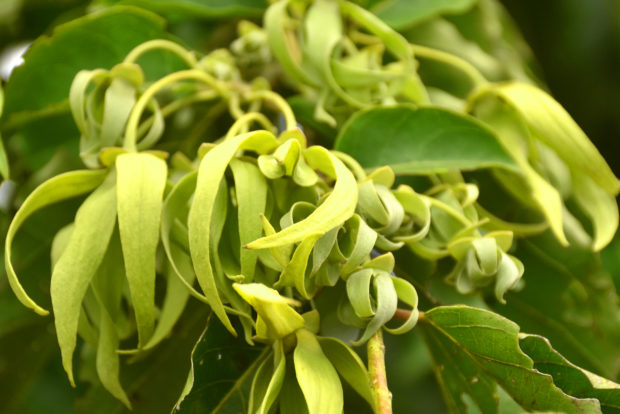
With the support of the national government and the private sector, seedlings of ylang-ylang (Cananga odorata) were planted in 700 hectares of almost barren land accessible only by foot or motorcycles.
“We have planted hundreds of hectares in the mountains of the different sitios of Barangay Laoag,” said Eleo Limos Ocal, 60.
But only a few of the trees have started to produce flower buds since these were planted in 2015, and it took around five years before these started to blossom.
It was businessman Fred Reyes, a chemist from Lingayen town, who encouraged the planting of ylang-ylang, “to bring back to the country the business of exporting the ylang-ylang oil to countries that manufacture perfumes.”
The perfumes with ylang-ylang oil include Chanel No. 5, Coco Mademoiselle, Joy, L’Air du Temps, Angel and Youth Dew.
Top exporter
Reyes, who owns ChemWorld, said the Philippines used to be the world’s top exporter of ylang-ylang oil until it was overtaken by Madagascar, a French colony. But when French perfume manufacturers decided to reduce their buying prices, Madagascar started cutting down the trees.
“Because of this, we could reposition again as the number one exporter of ylang-ylang oil,” he said, adding that the country had ready buyers of the first-grade ylang-ylang oil from the world’s top fragrance houses in France and Germany.
PRIME MOVERS Eleo Ocal (in cap and sunglasses, top photo) and Tito Cortez of Society of Aguilar Environmentalists of Pangasinan helped plant ylang-ylang trees in 700 hectares of almost barren land in Aguilar town, Pangasinan province, including upland tree farms at Sitio Mapita. —PHOTOS BY WILLIE LOMIBAO
Reyes coordinated with his high school classmate, Lingayen Mayor Leopoldo Bataoil, to put up ylang-ylang plantations in the province’s second congressional district in 2014, when Bataoil was its representative.
People’s organizations
Bataoil tapped several people’s organizations (POs) to produce seedlings and plant them in the mountains of three Pangasinan towns. The project was registered under the national greening program (NGP) of the Department of Environment and Natural Resources (DENR).
There are three POs with plantations in Aguilar (Sitio Mapita in Barangay Laoag), Bugallon (Barangay Hacienda) and Mangatarem (Barangay Bueno), all under the NGP.
Reyes said that in Hacienda, where he was directly involved, the total planted area was 180 ha while 120 ha more were being worked out with the DENR.
But it was trial-and-error for members of the groups. Though they had already been engaged in reforestation projects, they were also planting ylang-ylang for the first time.
Ocal, treasurer of Society of Aguilar Environmentalists of Pangasinan, said the project started with buying 20 kilograms of seeds from Anao town in Tarlac province, which had long established ylang-ylang miniforests.
A kilogram, which costs P3,000, can produce about 15,000 seedlings.
A nursery was initially put up at Barangay Quetegan in Mangatarem, but it was transferred to Bueno where Bataoil acquired a property.“
“When the seedlings had reached two feet, the plantation areas were not prepared yet, so the seedlings grew high and developed deep roots already,” recalled Ocal, who was in charge of the nursery.
Persevered
The PO members still persevered and brought the seedlings to the mountains.
Since the bagged seedlings were heavy, they sometimes removed the soil from bags as they used motorbikes to transport these to the plantation area, about 3 kilometers from the barangay road.
By the time replanting was done, it was already summer, causing high mortality rate for the seedlings from humid weather and dry soil.
SWEET SCENT The oil of ylang-ylang flowers is used as base for expensive perfumes. Farmers’ groups in Aguilar, Pangasinan, are hoping that the propagation of ylang-ylang trees will create livelihood opportunities in their town.
“Ylang-ylang trees need plenty of water to survive and only those planted along the river survived,” Reyes said, noting that only 5 percent of the seedlings grew healthy.
Undeterred, the groups started planting again. Bataoil worked for a budget for a reservoir that would be filled with water from a nearby creek. The members manually fetched water for irrigation.
Reyes established water impounding facilities and drip irrigation system in Hacienda, where more than 30,000 trees had been planted.
Stony soil
The POs also had to contend with stony soil, which they removed and replaced with garden soil.
They also used organic fertilizer on the trees and carried out “ring weeding,” a process of removing the weeds around the seedling and creating “fire lines” to prevent forest fires from burning the trees.
“All the work is physically taxing, but the seedlings are growing. When a seedling dies, we replant,” Ocal said.
The last evaluation by the DENR showed that plantation has 87 percent survival rate, and there are trees (remnants of those planted in 2014) that have started to flower.
Constant care
Reyes said the plantations needed constant care as the POs wait for the time they could smell the sweet success of their labor.
It would not take long before the ylang-ylang trees could start producing 3 kilograms of flowers a week all year round, he said.
“We expect to start building the distillation facilities in 2020,” he added.
ChemWorld will buy the flowers for distillation, at an average price of P60 per kg.
“The tree can be productive for 25 years. Each hectare of ylang-ylang plantation has 277 trees. Flowers are picked at dawn and should be processed within two hours for best yield,” Reyes said.
There are three grades of ylang-ylang essential oil.
“We can extract 0.5 percent first-grade oil, or 0.5 liter for every 100 kg of flowers. There can be a total of 1.5 L of second and third grades per 100 kg of flowers,” Reyes said.
While the main purpose of the plantation is for ylang-ylang oil, the areas would eventually be turned into an ecotourism destination, which may mean more earnings for the POs, Reyes said.